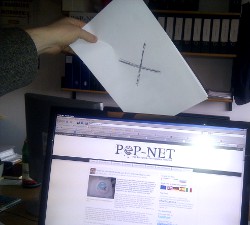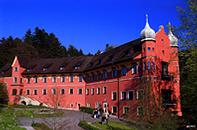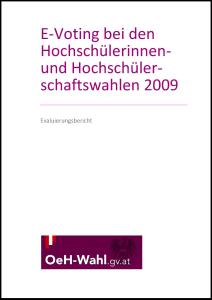Only articles in with the "e-voting" tag are displayed
To display all articles click
here.
 |
14. March 2011 – 14:46 by John Heaven (TuTech Innovation GmbH)
|

Voting via the internet
The Estonian national elections took place on 6th March, returning the incumbent centre-right coalition to power. As in previous elections, citizens were also able to cast their vote over the internet — this time from 24th February to 2nd March.
The overall election turnout increased only marginally (by less than two percentage points over the last general election) but there was a massive rise in voters who cast their vote on the internet, from 5.5% to 24.3%. This may be partly due to the longer time during which voters could go to the online polls, which increased from three days to seven; but it also suggests an increasing awareness and acceptance of the technology.
As well as voting online, Estonians made use of other online tools to help them decide whom to vote for: the website https://valijakompass.err.ee/, which is a tool that helps voters pick a party according to the policies they agree with, reports over 100,000 hits. (Thanks to Hille Hinsberg for the tip-off!)
You can find a more detailed analysis of the results by Manuel Kripp, Director of the Austrian E-Voting Competence Centre E-Voting.cc, here.
Posted in News | No Comments »
 |
18. November 2010 – 10:32 by John Heaven (TuTech Innovation GmbH)
|

Manuel Kripp, MD of E-Voting.cc
Manuel Kripp, Managing Director of PEP-NET member E-Voting.cc, recently visited the US during the mid-term elections, so I was very curious to find out what he had got up to. We spoke about electronic voting machines, the role of social media in the US elections, and the need for change management when introducing E-Voting technology.
To find out what E-Voting.cc does, see their website or my previous interview with Manuel’s predecessor Robert Krimmer.
John Heaven: Hi Manuel. I hear you’ve been travelling recently. What were you up to?
Manuel Kripp: I was invited to participate in the 2010 U.S. election program organised by the International Foundation for Electoral Systems (IFES), and by the the Electoral Assistance Commission (EAC) to observe the election on Tuesday 2nd November.
The conference was well attended by experts from around the world, including Thomas Wilkie (Chief Executive, IFAS), Doug Chapin (Pew Centre on the States), and Bob Carey (Federal Voting Assistance Program). The Jo C. Baxter prize was presented to Dr Kwadwo Afari-Gyan, Chairman of Ghana’s Electoral Commission, for invaluable contributions to democracy in Ghana.
The focus of my visit was on seeing how elections are conducted in other countries from around the world, and comparing the US electoral system with how things are done in Europe.
Read the rest of this entry »
Posted in Interview, members, News, Trends, Visions | No Comments »
 |
23. July 2010 – 13:13 by Centre for E-Government
|
The 4th international conference on e-voting just started. Taking place in Castle Hofen, a small castle near Bregenz, This year’s meeting is co-organized by E-Voting.CC, the Council of Europe and the German Gesellschaft für Informatik. Around 70 international experts will discuss the latest developments in e-voting. The topics range from practical experience reports to certification and end-to-end verification. [a visiter’s report]
The official hashtag for the conference is #evote2010.
After the welcome speech of chairman Robert Krimmer and a big thank you to the sponsors and partners Michael Remmert gave an overview of the activities of the organisers and yesterdays workshop (on a draft on international guidelines on e-voting and transparency of e-voting systems. The Council of Europe has taken notice of the topic e-voting, e.g. with the Comittee of Ministers on e-democracy. Since 2005 a lot has been achieved and there are a number of tools that can be used. However, in the upcoming years the Council will change its focus and concentrate more on the governance of the internet following democratic principles.
Read the rest of this entry »
Posted in Events | No Comments »
 |
15. June 2010 – 10:13 by E-Voting.CC
|
 Our “EVOTE” Conferences have become an international meeting point for e-voting experts worldwide. This year’s “EVOTE2010″ will be the fourth of it’s kind.
Our “EVOTE” Conferences have become an international meeting point for e-voting experts worldwide. This year’s “EVOTE2010″ will be the fourth of it’s kind.
Today, June 15, the reduced early registration fee ends! (300€ including social events)
From June 16 the price will be 360€.
In order to get the discounted fee, register online today!
The 4. International Conference on Electronic Voting will be held from July 21 to 24 of 2010 in Bregenz, Austria. Please have a look at our internationally casted conference programme here.
We are looking forward to seeing you at the conference in July – so register now!
Daniel Botz – EVOTE2010 Conference Manager
Posted in Debate Europe, Events, experince, ICT, News, Projects, Uncategorized | No Comments »
 |
19. May 2010 – 09:16 by John Heaven (TuTech Innovation GmbH)
|

Photo of Robert Krimmer
When Britons went to vote in the General Election on 6th May, some of them were locked out of the polling booths and were not able to cast their votes. An article on the PublicTechnology website suggested that eVoting could be the answer to this problem, and should be given another chance.
I spoke to Robert Krimmer – Director and Founder of the Competence Center for Electronic Voting in Austria and a founding member of PEP-NET – to find out whether he agreed.
John Heaven: Hi Robert. What is E-Voting.cc, and what do you mean by eVoting?
Robert Krimmer: E-Voting.cc is an Austrian Non-Governmental Organisation (NGO) that fosters the development of eVoting. We deal with any type of eVoting – whether electronic machines in polling booths, internet voting, voting through cash machines, mobile phone voting. The important thing is that the act of casting a vote is done electronically.
JH: So does that include the punch-card system that is used in the United States?
RK: No, that is not included because the votes are counted electronically but not cast electronically. We use the Council of Europe’s definition of eVoting.
JH: You have heard about the problems that UK voters had last week: there were complaints about voters queuing for hours only to be turned away at 10pm. Could eVoting have solved this problem, as discussed in a recent PublicTechnology article?
Read the rest of this entry »
Posted in experince, Interview, members, Trends | No Comments »
 |
28. April 2010 – 19:44 by E-Voting.CC
|
 The final report on the Austrian E-Voting use is online an available for download in German here. Read the short summary of the report on Pep-Net.eu:
The final report on the Austrian E-Voting use is online an available for download in German here. Read the short summary of the report on Pep-Net.eu:
The implementation of e-voting for the elections to the Austrian Federation of students was one of the most sophisticated e-government projects in 2009. It’s aim was to complement the paper based voting with an electronic voting channel. Together with the implementation of e-voting the legal basis was adapted to include an electronic election administration.
This first of a kind implementation of e-voting in Austria was technically successful. Almost 1% (2.161) of the eligible students cast their votes electronically between 18th and 22nd of May 2009. For identification and authentication, they used the citizen card (the Austrian model of a smart card with digital signature) and a suitable smartcard-reader device, which was handed out for free. The anonymity was performed by using a cryptographic protocol in the post-electoral phase, similar to a paper based postal voting procedure. The e-voting servers were placed in two data centers of the Federal Computing Centre to allow for fail-safe operation.
The use of the citizen card was appropriate because of its associated high safety and powerful legal standing. However the penetration of the citizen card is rather low at present. Therefore, the federal ministry of science and research started the initiative studi.gv.at with the purpose to raise awareness and penetration of the citizen card amongst students. While over 14.000 students made use of this opportunity, only a small portion of them used e-voting. Main reason to this is the general limited number of applications aimed at students which make use of this card. The general acceptance and with it the penetration numbers for this smart card will only be reached when a wide range and a large number of additional services are provided with appropriate functionality, especially for students.
The discussion around e-voting was rather controversial with clear pro and contra positions. On the one side the federal ministry of science and research and on the other side selected representatives of the federation of students. The discussion dominated the electoral campaigns and hurt the institution of the elections.
For future uses of e-voting in Austria the penetration of identification and authentication means has to be raised as well as a more positive atmosphere amongst the stakeholders has to be reached.
by E-Voting.CC
Posted in Events, experince, News, Projects | No Comments »
 |
26. February 2010 – 10:32 by E-Voting.CC
|
Today, on Friday 26th of February, the extended deadline for paper submission for the EVOTE2010 conference is due! The last chance to submit you scientific papers and participate in our renowned issue of our fourth issue of the International Conference on E-Voting – EVOTE2010.
The conference will take place from July 21st to July 24th in Bregenz at the beautiful lake Constance.
We are looking forward to another highly international and very interesting event!
Daniel Botz – E-Voting.CC
Posted in Events, News, Projects, Uncategorized | No Comments »
 |
16. February 2010 – 15:01 by E-Voting.CC
|
In response to the large number of requests from the community, the organizing committee of the 4th Electronic Voting Conference EVOTE2010 decided to extend the deadline for submission of papers by two weeks from Friday February 12 to Friday February 26, 2010.
Please find further information, templates and the call for papers here.
I hope this helps to finish your papers in time!
Daniel Botz, E-Voting.CC
Posted in members, News, Projects | No Comments »
 |
25. June 2009 – 15:03 by E-Voting.CC
|
Earlier I have written about the Student Union elections of May 2009 which were Austria’s first use of a legally binding electronic voting system.
The E-Voting system required the students to authenticate themselves using a citizen card. In Austria this “citizen card function” is included in the social security card, which is called e-card. The e-card was launched in March 2005 in order to modernize the old fashioned system of legitimizing the citizen’s status in front of doctors via the paper version of the “Krankenschein”.
The e-card has since then been issued 8.5 million times according to the official website. 11.151 partners accept the e-card in doctor’s practices all over Austria and it has been used 405 million times for this purpose. But the e-card is much more than a tool for more efficient social security administration. Read the rest of this entry »
Posted in good practice, News, Projects, Trends | No Comments »
 |
24. June 2009 – 16:30 by E-Voting.CC
|
The Austrian Expatriate World Council was founded in 1952 aiming to coordinate the various existing associations of Austrian citizens living abroad. Its primary function is to represent its members in front of the Austrian federal government, public authorities, political parties and relevant departments in the economic and cultural field. It is governing body of over 170 associations and has several thousand members.
The organization has now again, as in previous years, made an effort to research its members’ needs. From the beginning of March until April 20th an anonymous online survey has been conducted to find a better understanding for these needs and to communicate them to the Austrian Foreign Ministry.
The Austrian Federal Computing Centre (BRZ) was in charge of designing, setting up and implementing the online platform. The survey consisted of ten themes related to which e-Government and e-Participation services expats want from Austria. Three of them were to be picked as a choice, an own suggestion could also be added. The answers were weighted, points were given according to the relative importance. The themes were:
Read the rest of this entry »
Posted in good practice, News, Projects, Trends, Uncategorized | No Comments »





 The final report on the Austrian E-Voting use is online an available for download in German
The final report on the Austrian E-Voting use is online an available for download in German 





